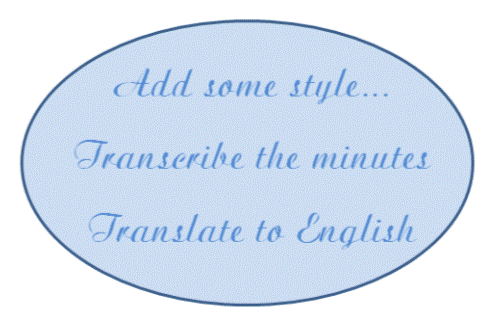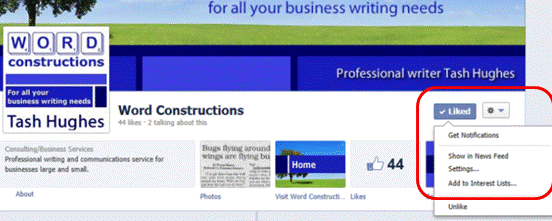TashWord
Tash is a professional writer who loves helping people communicate clearly and effectively.
Once you start blogging you will start getting comments. Unfortunately, a large proportion of them will probably be spam, but the real comments are great.
As I wrote a few years ago (back in December 2007 to be precise – old content that still rings true!), I think you have five choices about how to act on negative comments.
Spam and outright abuse I think should be deleted and forgotten.
Comments that just disagree with you or realistic or even constructive criticisms are a different story.
Keeping negative comments in your blog seems honest to me – you’re not censoring and are being transparent.
It may be confronting to leave negative comments live, but it gives you a chance to be human and show that you are open to feedback – especially if you show that you have learnt from it.
Have you ever left negative comments in your blog? What response have you got from doing so?
Would you use negative comments to stir a controversy or a discussion?
Merry Christmas!
I hope you, your family and friends have a lovely day today (whether you celebrate Christmas or not).
I would also like to wish you a happy and successful 2013.
Please note that I will be working reduced hours from now until the 3rd of January so please be patient if I don’t reply to emails or phone messages instantly!
Recently, I saw an article called ‘do you need to hire a SEO expert’.
My immediate response was yes and no – depending on what you mean by ‘need’, you may or may not need a SEO expert.
Do you need an SEO expert because you have to be qualified or an ‘expert’ to do it (to at least an acceptable level)? No, not really.
However, an expert may do it faster and have knowledge to work more efficiently and get better results, but it is possible to do it yourself. Of course, if you don’t know anything about SEO and have to study it first, an expert’s value is greater.
Do you need an SEO person to help you get SEO done alongside everything else you do? Then quite possibly, yes you do. It depends on how busy you are and how much importance you place on SEO obviously, but SEO is one thing you can consider outsourcing.
Of course, if you are just after time saving, you may be able to use someone to work on your SEO (such as finding places to guest blog or comment and checking your site for deadlinks and duplicate meta data) rather than finding someone qualified to give you advice and expertise.
Again, it is a maybe type of answer.
Do you need a professional writer to help you get everything done in a working day? Yes, you quite possibly do need help.
Do you need a professional writer because you can’t do it yourself? That depends on what you’re after. Most people in business can probably write webcopy and blog posts themselves so a writer is perhaps not necessary to get the content onto the page.
However, some people can’t write well so would get much better results via a professional – and probably find it is done with less time and stress, too.
Some people can write reasonably well, but will still benefit from someone who has a better understanding of business writing and can be objective about the content.
So if you can write with good spelling and grammar, understand about writing for a business audience and have plenty of time, no you don’t need a professional writer to help you!
Doing some marketing research for a client, I came across the following sentence:
With over 37 year’s experience, where sure to make your Christmas party a huge success!
I admit I was stunned to see this error and thus a new Monday Meaning post was inspired.
where: [noun] location or place; [adverb] in what place/position/respect; ]pronoun] which place or point?
I wonder where Simon will be on Christmas Day this year?
we’re [contraction]: we are – we’re is simply an abbreviation of ‘we are’ where the apostrophe replaces the space and letter a.
We’re going to my Father’s house for Christmas lunch this year.
I’m also adding a word that sounds different but has similar spelling and does sometimes get used in place of where and we’re.
were [verb]: ‘to be’ in the past (ie the past tense) for a plural (we, they) or second person singular (you) noun
We were at my Uncle’s last Christmas Day.
As a writer and communications manager, style guides are important.
It was only when I read a book by a freelance translator and transcriber, Kris Emery, that I thought about style guides for other professionals dealing with words.
If your business need documents translated or meetings transcribed, you are paying someone to give you a written document that will be used in some way.
So obviously you want that document to be prepared in a way that is easy for you to use.
That could include details such as :
You have a number of options really…
A document-specific style guide will by nature be about details, lots of little details that add up to a polished and useful end result.
It can be pulled together in two hours or so if you have an existing document to work from; faster if you have a style template to work from. That’s not much time compared to adjusting a document every time someone translates or transcribes for you.
What are the first three things you would add to your style guide?
Are they things you consider the most important or just the hardest to do so you prefer someone else gets them right?
Is it just me, or do you have more tolerance of a small business making mistakes than a big business?
That is, for mistakes like spelling errors, dead links on their website, out of date information and lack of clarity in a message.
I think if you have the budget for huge campaigns, you have the budget to get a writer or editor to help you avoid stupid mistakes. A sole trader on the other hand often has less money to spend and more hats to wear so mistakes are a little more excusable.
I was asked by a major entity to complete a survey that they intend to use to produce some data that can impact on the digital media and brands.
It was longer than I expected but more than that, it was very disappointing from a group that is producing such a report.
Having a poor survey through lack of attention to detail reduces their credibility – if they can’t get the questions right, is their analysis going to be any good?
Compared to the time and money they have put into preparing and promoting this survey, and then turning the results into a report, it would have cost little to have had it reviewed by a writer or editor to ensure it would work. It’s like spending a million dollars to build your dream house but not checking the architect remembered to add a front door.
Some of the issues I came across in this particular survey were:

Poor data can’t result in a good report, whichever way you add it
One better written question they included asked where I got inspiration for my blog posts. I could only select one answer, which is limiting as I find inspiration in many places. However, I again used the ‘other’ option and wrote I am inspired by poor communications efforts I see – such as surveys like this with poor questions! You have to find fun where you can, I say!
So not a great survey (and I will struggle to trust their results) but it did inspire a blog post and gave me some amusement using their ‘other’ fields!
Have you ever looked at how you divide up the work in your business?
Last November, I wrote about looking at tasks rather than entire jobs when deciding on who is needed in a team (or who does what in an existing team).
As a sole trader it can be overwhelming how many things you have to do.
It can also be overwhelming to think about what you could outsource or employ someone for to gain more control.
I know if I look at what I’d like to get someone else to do (and already do so for some tasks), it seems like a mix of tasks that wouldn’t be easy to give to one role. Or would require a lot of training if I did give it to one person.
However, by taking it one task at a time I was able to see what could be done by others.
So I outsourced the data entry of my accounts to a bookkeeper. Later, I also got her to compile some quarterly stats reports for me.
I got someone else to manage sending out email messages – I write the content but someone else gets it into the email system, manages the email list and sends them for me.
Hiring one person or handing out many tasks at once would obviously free up more time instantly (excluding training time anyway). But if it is too hard to set that up, it won’t happen so a series of small improvements was much more effective for me.
Would you find it easier to look at tasks than jobs, too?
Despite having a pile of business related books to read (or finish reading), and some more business recordings and webinars to hear, I have finished this eBook by Kris Emery.
I think the fact it is shorter than many business books (being a 141 page eBook) makes it easier to get through it, but that’s not enough by itself. Freelance your heart out is a friendly, chatty style that is easy to move from page to page so it is achievable relatively quickly.
Kris works as a freelance transcriber and translator, and this eBook is basically her journey from corporate employee to successful freelancer. From her journey, Kris has picked up a few things and she shares them in this eBook so others can enjoy a freelance lifestyle if they wish.
While some parts are specific to transcribing and translating, most of the eBook is easily relatable for other freelance skills – as a freelance writer, I know I was either nodding along or finding a connection throughout her tips.
There are 25 specific tips in the book, each of which offers value to someone thinking of or starting as a freelancer. Read as part of the entire eBook, these tips are even more valuable as they come after a story or example that illustrates the tip.
As I’ve said before, hearing someone else’s business story is not my prefered way of learning something about business. However, Kris actually states the lessons, not just her story, so it becomes more useful than just her freelance story.
The writing style is easy to read, but does have some substance to it, and reading the eBook inspired some ideas and thoughts – and a few blog posts as well! A few spots I found hard to read, and needed to be reread more than once, which was a shame.
I like how Kris has included some practical information as well as more general tips (like learn to negotiate and set greater goals).
It is not, however, a complete guide to starting a freelance business, but gives some good ideas on what is needed and hope that it is possible for many people.
I also like the fact that she doesn’t make freelancing seem like easy street or something to do in your spare time to make a fortune – being a freelance anything takes time and dedication to make it work. It can br a great lifestyle (for example, I love being able to take my son to kinder and help at school as required) but it usually is much harder than having a traditional job.
Whether you end up working freelance or changing corporate jobs instead, having a realistic idea of freelancing could help you make a wiser decision about your future.
If you have ever tried freelance work, did you find it tough? Did you expect it to be easier than the reality turned out to be?
Like it or not, Facebook is a big site that attracts millions of people to it. Every day. Repeatedly.
As a business, it is important to understand how Facebook could be part of your marketing plan – note I don’t say you have to be ON Facebook but I do think it is a good idea to actively know about it and consciously decide whether or nor to use it for marketing.
If you’ve been on Facebook or read many marketing/SEO blogs, you’ll know that Facebook has changed things a number of times.
Recent changes, however, have made businesses wonder if Facebook will be a viable marketing option soon. Updates on business pages do not go into your fans’ news feed by default any more – some do, but fans have to show an interest first and it’s still no guarantee.
Facebook is moving towards charging businesses to be in front of fans.
As a business, it’s understandable that they want to make money. For SMBs, there is a real and justifiable fear that they won’t be able to compete in the advertising stakes against the big guys. A problem social media supposedly overcame for many SMBs.
At least they have now added notifications so fans can choose to be notified of updates on a page.
I don’t see this as a small answer. I never thought of Facebook as that important my business relies on it so I already use a number of other avenues.
But some businesses have put a lot into their Facebook page and could be challenged by looking elsewhere.
The appeal of Facebook is that so many people use it. But how many of those people are really your target market anyway? A targetted option may have fewer users but more of them will be interested so it could offer much more value anyway.
To me, the risk of Facebook (and similar sites) is lack of ownership. You don’t ‘own’ your Facebook profile in the same way you own your website. Facebook can change the rules or disappear, leaving you without all you built up.
One way to keep using Facebook but have less reliance on it is to add ‘like’ buttons to your site.
That means people can still refer to you and your site to their Facebook friends but traffic comes to your site, not your Facebook profile.
Chris Syme offers a number of good ideas in a recent blog post and I’d add a few more:
What would happen to your business tomorrow if Facebook suddenly wanted to charge too much for your page?
Do you have other viable options already in place?
If you throw enough mud, some of it will stick
I have no idea who first said that, but like all clichés and sayings it contains a lot of truth – and can also distract from the truth.
I am reading a book on freelancing at the moment. The author, Kris Emery, writes about her early days as a translation and transcription freelancer by saying her approach was to throw a lot of mud.
However, she ‘threw a lot of mud, but just not in any particular direction… [she] didn’t have the big picture really figured out’.
I don’t think Kris is alone in not setting plans or specific goals for her business – I know I haven’t always had clear goals, either, and that it can be easy to get caught in all the everyday details and forget to keep a direction and goal in mind.
A direction and goal also helps keep the motivation and passion up so it’s important.
Do you have clear goals and ideals for your business?
How often do you review them?
Kris went on to write ‘If I’d had just one focus, one goal to focus on, it would have been a heck of a lot easier. Cutting my losses was empowering and helped me gain that focus.’
Everyone is busy these days, and often being busy can get in the way of creating and following a strategy.
But how much of that is just busy-work and unimportant? How much is perhaps important but not targetted at heading towards the right goals?
By setting a focus in one direction, it is easier to aim that mud so some of it really will stick and easier to walk away from those tasks (and clients) that are busy work or distracting us.
I know that I got some focus back from attending PB Event and have dedicated more time to backend tasks that had been added to a list of things to do ‘as soon as I get time’. It is possible to make time when you have priorities set – simply stop wasting time on the non essentials (ie cut your losses) and accept small pockets of time add up to mean a lot.
What sorts of things help you regain some focus and motivation?
Do you think you are aiming your business’ mud or just hoping for the best as you throw?
*Image courtesy of BigStockPhotos
Recent Comments